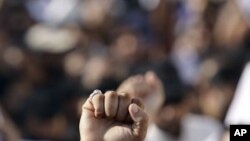The U.N. Human Rights Office condemns the harsh sentences handed down by military courts in Bahrain this week against medical workers and dozens of protesters. The World Health Organization says preventing health care workers from aiding people injured in conflict violates international law.
The U.N. Human Rights Office says the harsh sentences raise serious doubts about the fairness of these proceedings.
This week, Bahrain’s military-run Court of National Safety sentenced 20 medical staff to prison terms from five to 15 years. More than 30 other people who participated in protests against the government received sentences ranging from three years imprisonment to the death penalty.
Spokesman for the U.N. High Commissioner for Human Rights, Rupert Colville, says reliable sources say the defendants had limited access to lawyers and in most cases lawyers did not have enough time to properly prepare their clients’ defense.
“One defense lawyer representing a number of medical professionals told reporters that the trial lasted no longer than 10 minutes," said Colville. "The Court of National Safety is also not investigating torture allegations and has not permitted recordings of the proceedings. So, all of that causes serious concern.”
Eight doctors who treated the injured during the country’s uprising reportedly have received 15-year sentences. Other medical workers at Bahrain’s largest public hospital, the Salmaniya Medical Complex, have been sentenced to between five and 15 years.
Bahrain authorities accuse the doctors and nurses of using the hospital for anti-government activity, of possessing firearms and of having confiscated medical equipment.
The World Health Organization does not openly criticize the Bahrain government, but it does question the prosecution of medical workers.
WHO spokeswoman, Fadela Chaib, says in times of conflict, medical neutrality must be respected under the Geneva Convention.
“Health care workers have a moral and ethical obligation to treat the injured regardless of their political affiliation," said Chaib. "And, they should never be punished for doing what is required by this obligation. Health care workers must be allowed to access them and to treat them and medical facilities, including transport and personnel must all be protected. This is what we call medical neutrality and it must be respected.”
Since protests against Bahrain’s ruling monarchy erupted in March, Human Rights groups report 34 people have been killed, 1,400 arrested and about 3,600 people fired from their jobs.
The U.N. Human Rights Office is calling on the government to make sure every detained person is charged with a recognizable criminal offence and has enough time to prepare a defense case.
UN Condemns Bahrain’s Harsh Sentences Against Protesters
- By Lisa Schlein








